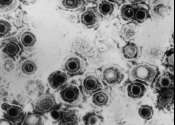How herpes infection may impair human fetal brain development
Three cell-based models shed light on how herpes simplex virus type 1 (HSV-1) infection, which can spread to the fetal brain during pregnancy, may contribute to various neurodevelopmental disabilities and long-term neurological ...
Oct 22, 2020
0
46









